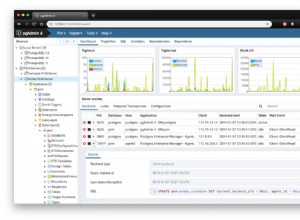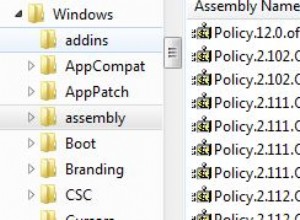BEARBEITEN :um Race Conditions
zu verhindern Verwenden Sie in gleichzeitigen Umgebungen WITH (UPDLOCK) in der korrelierten Unterabfrage oder EXCEPT 'd SELECT . Das Testskript, das ich unten geschrieben habe, erfordert es nicht, da es temporäre Tabellen verwendet, die nur für die aktuelle Verbindung sichtbar sind, aber in einer realen Umgebung, die mit Benutzertabellen arbeitet, wäre es notwendig.
MERGE erfordert kein UPDLOCK .
Inspiriert von der Antwort von mcl zu:Unique Index &Lassen Sie die Datenbank einen Fehler ausgeben, entschied ich mich für Benchmark bedingte Einfügungen vs. try/catch .
Die Ergebnisse scheinen die bedingte Einfügung über Try/Catch zu unterstützen, aber YMMV. Es ist ein sehr einfaches Szenario (eine Spalte, kleine Tabelle usw.), ausgeführt auf einer Maschine usw.
Hier sind die Ergebnisse (SQL Server 2008, Build 10.0.1600.2):
duplicates (short table)
try/catch: 14440 milliseconds / 100000 inserts
conditional insert: 2983 milliseconds / 100000 inserts
except: 2966 milliseconds / 100000 inserts
merge: 2983 milliseconds / 100000 inserts
uniques
try/catch: 3920 milliseconds / 100000 inserts
conditional insert: 3860 milliseconds / 100000 inserts
except: 3873 milliseconds / 100000 inserts
merge: 3890 milliseconds / 100000 inserts
straight insert: 3173 milliseconds / 100000 inserts
duplicates (tall table)
try/catch: 14436 milliseconds / 100000 inserts
conditional insert: 3063 milliseconds / 100000 inserts
except: 3063 milliseconds / 100000 inserts
merge: 3030 milliseconds / 100000 inserts
Beachten Sie, dass selbst bei eindeutigen Einsätzen geringfügig vorhanden ist mehr Overhead zum Ausprobieren/Fangen als eine bedingte Einfügung. Ich frage mich, ob dies je nach Version, CPU, Anzahl der Kerne usw. variiert.
Ich habe das IF nicht bewertet bedingte Einfügungen, nur WHERE . Ich nehme das IF an Abwechslung würde mehr Overhead zeigen, da a) Sie zwei Anweisungen hätten und b) Sie die beiden Anweisungen in eine Transaktion einschließen und die Isolationsstufe auf serialisierbar (!) setzen müssten. Falls jemand wollte Um dies zu testen, müssten Sie die temporäre Tabelle in eine normale Benutzertabelle ändern (serialisierbar gilt nicht für lokale temporäre Tabellen).
Hier ist das Skript:
-- tested on SQL 2008.
-- to run on SQL 2005, comment out the statements using MERGE
set nocount on
if object_id('tempdb..#temp') is not null drop table #temp
create table #temp (col1 int primary key)
go
-------------------------------------------------------
-- duplicate insert test against a table w/ 1 record
-------------------------------------------------------
insert #temp values (1)
go
declare @x int, @y int, @now datetime, @duration int
select @x = 1, @y = 0, @now = getdate()
while @y < 100000 begin
set @y = @y+1
begin try
insert #temp select @x
end try
begin catch end catch
end
set @duration = datediff(ms,@now,getdate())
raiserror('duplicates (short table), try/catch: %i milliseconds / %i inserts',-1,-1,@duration,@y) with nowait
go
declare @x int, @y int, @now datetime, @duration int
select @x = 1, @y = 0, @now = getdate()
while @y < 100000 begin
set @y = @y+1
insert #temp select @x where not exists (select * from #temp where col1 = @x)
end
set @duration = datediff(ms,@now,getdate())
raiserror('duplicates (short table), conditional insert: %i milliseconds / %i inserts',-1,-1,@duration, @y) with nowait
go
declare @x int, @y int, @now datetime, @duration int
select @x = 1, @y = 0, @now = getdate()
while @y < 100000 begin
set @y = @y+1
insert #temp select @x except select col1 from #temp
end
set @duration = datediff(ms,@now,getdate())
raiserror('duplicates (short table), except: %i milliseconds / %i inserts',-1,-1,@duration, @y) with nowait
go
-- comment this batch out for SQL 2005
declare @x int, @y int, @now datetime, @duration int
select @x = 1, @y = 0, @now = getdate()
while @y < 100000 begin
set @y = @y+1
merge #temp t using (select @x) s (col1) on t.col1 = s.col1 when not matched by target then insert values (col1);
end
set @duration = datediff(ms,@now,getdate())
raiserror('duplicates (short table), merge: %i milliseconds / %i inserts',-1,-1,@duration, @y) with nowait
go
-------------------------------------------------------
-- unique insert test against an initially empty table
-------------------------------------------------------
truncate table #temp
declare @x int, @now datetime, @duration int
select @x = 0, @now = getdate()
while @x < 100000 begin
set @x = @x+1
insert #temp select @x
end
set @duration = datediff(ms,@now,getdate())
raiserror('uniques, straight insert: %i milliseconds / %i inserts',-1,-1,@duration, @x) with nowait
go
truncate table #temp
declare @x int, @now datetime, @duration int
select @x = 0, @now = getdate()
while @x < 100000 begin
set @x = @x+1
begin try
insert #temp select @x
end try
begin catch end catch
end
set @duration = datediff(ms,@now,getdate())
raiserror('uniques, try/catch: %i milliseconds / %i inserts',-1,-1,@duration, @x) with nowait
go
truncate table #temp
declare @x int, @now datetime, @duration int
select @x = 0, @now = getdate()
while @x < 100000 begin
set @x = @x+1
insert #temp select @x where not exists (select * from #temp where col1 = @x)
end
set @duration = datediff(ms,@now,getdate())
raiserror('uniques, conditional insert: %i milliseconds / %i inserts',-1,-1,@duration, @x) with nowait
go
truncate table #temp
declare @x int, @now datetime, @duration int
select @x = 0, @now = getdate()
while @x < 100000 begin
set @x = @x+1
insert #temp select @x except select col1 from #temp
end
set @duration = datediff(ms,@now,getdate())
raiserror('uniques, except: %i milliseconds / %i inserts',-1,-1,@duration, @x) with nowait
go
-- comment this batch out for SQL 2005
truncate table #temp
declare @x int, @now datetime, @duration int
select @x = 1, @now = getdate()
while @x < 100000 begin
set @x = @x+1
merge #temp t using (select @x) s (col1) on t.col1 = s.col1 when not matched by target then insert values (col1);
end
set @duration = datediff(ms,@now,getdate())
raiserror('uniques, merge: %i milliseconds / %i inserts',-1,-1,@duration, @x) with nowait
go
-------------------------------------------------------
-- duplicate insert test against a table w/ 100000 records
-------------------------------------------------------
declare @x int, @y int, @now datetime, @duration int
select @x = 1, @y = 0, @now = getdate()
while @y < 100000 begin
set @y = @y+1
begin try
insert #temp select @x
end try
begin catch end catch
end
set @duration = datediff(ms,@now,getdate())
raiserror('duplicates (tall table), try/catch: %i milliseconds / %i inserts',-1,-1,@duration,@y) with nowait
go
declare @x int, @y int, @now datetime, @duration int
select @x = 1, @y = 0, @now = getdate()
while @y < 100000 begin
set @y = @y+1
insert #temp select @x where not exists (select * from #temp where col1 = @x)
end
set @duration = datediff(ms,@now,getdate())
raiserror('duplicates (tall table), conditional insert: %i milliseconds / %i inserts',-1,-1,@duration, @y) with nowait
go
declare @x int, @y int, @now datetime, @duration int
select @x = 1, @y = 0, @now = getdate()
while @y < 100000 begin
set @y = @y+1
insert #temp select @x except select col1 from #temp
end
set @duration = datediff(ms,@now,getdate())
raiserror('duplicates (tall table), except: %i milliseconds / %i inserts',-1,-1,@duration, @y) with nowait
go
-- comment this batch out for SQL 2005
declare @x int, @y int, @now datetime, @duration int
select @x = 1, @y = 0, @now = getdate()
while @y < 100000 begin
set @y = @y+1
merge #temp t using (select @x) s (col1) on t.col1 = s.col1 when not matched by target then insert values (col1);
end
set @duration = datediff(ms,@now,getdate())
raiserror('duplicates (tall table), merge: %i milliseconds / %i inserts',-1,-1,@duration, @y) with nowait
go




